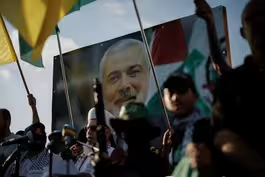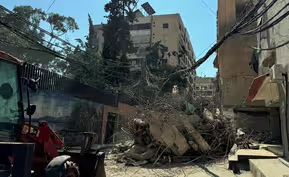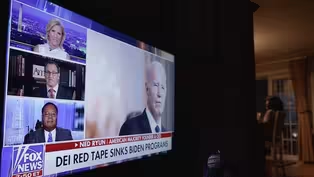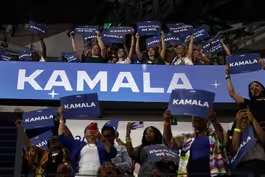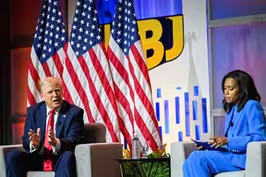
Mideast experts on cease-fire prospects after assassination
Clip: 7/31/2024 | 6m 44sVideo has Closed Captions
Mideast experts assess Gaza cease-fire prospects after Hamas leader's assassination
Ismail Haniyeh, the top political leader for Hamas, was killed by an airstrike in Iran. Both Hamas and Iran blamed Israel for the assassination. Geoff Bennett has views on the development from Nathan Brown, professor of political science and international affairs at George Washington University, and Hanin Ghaddar, the Friedmann Senior Fellow at The Washington Institute for Near East Policy.
Problems playing video? | Closed Captioning Feedback
Problems playing video? | Closed Captioning Feedback
Major corporate funding for the PBS News Hour is provided by BDO, BNSF, Consumer Cellular, American Cruise Lines, and Raymond James. Funding for the PBS NewsHour Weekend is provided by...

Mideast experts on cease-fire prospects after assassination
Clip: 7/31/2024 | 6m 44sVideo has Closed Captions
Ismail Haniyeh, the top political leader for Hamas, was killed by an airstrike in Iran. Both Hamas and Iran blamed Israel for the assassination. Geoff Bennett has views on the development from Nathan Brown, professor of political science and international affairs at George Washington University, and Hanin Ghaddar, the Friedmann Senior Fellow at The Washington Institute for Near East Policy.
Problems playing video? | Closed Captioning Feedback
How to Watch PBS News Hour
PBS News Hour is available to stream on pbs.org and the free PBS App, available on iPhone, Apple TV, Android TV, Android smartphones, Amazon Fire TV, Amazon Fire Tablet, Roku, Samsung Smart TV, and Vizio.
Providing Support for PBS.org
Learn Moreabout PBS online sponsorshipGEOFF BENNETT: For more on the killing of the Hamas leader in Iran, we get two views now, Nathan Brown, professor of political science and international affairs at George Washington University, and Hanin Ghaddar, the Friedmann senior fellow at the Washington Institute for Near East Policy.
That's a think tank.
Thank you both for being with us.
Hanin, I will start with you.
A question about the timing and location coming right after the killing of a top Hezbollah commander in Beirut.
And that this happened in Tehran following the inaugural of Iran's new president, what message does this send to Iran?
HANIN GHADDAR, Washington Institute for Near East Policy: Good evening.
Thank you for having me.
This is basically the main question.
What's happening now?
Like, Israel could have responded with one assassination one attack on Hezbollah after the Majdal Shams incident.
But I think the message with the assassination of Fuad Shukr in Lebanon and the assassination of Haniyeh in Tehran, also at the same time there has been some U.S. strikes in Iraq against the Shia militias, the Iran-backed Shia militias.
According to the Hezbollah perspective, the -- Iran's perspective, what they see is a coordinated attack.
Maybe it's not a coordinated attack, but this could be a message of pushing for deterrence, deterring Iran, not necessarily inviting Iran for a war.
I feel that, today, Hezbollah and the IRGC are facing a catch-22, in the sense that they do not want to reach a full-scale war, because this is not their war and this is not something that they want to go for, but at the same time they have to respond.
They have to walk very thin line in terms of what kind of response they have to achieve.
And they want to move from this episode as fast as possible because they want to avoid the full-scale war at all costs.
But the assassinations of these two senior people, because Fuad Shukr is number two in Hezbollah right after Hassan Nasrallah, this is a big blow.
And they want to stop bleeding all these commanders.
They have lost 400 militants, including high-rank commanders, since October 7, and they cannot afford to continue losing them.
So, if it's done right, if diplomacy steps in today, if it's done right, diplomacy can actually force an agreement and a deterrence for Hezbollah, rather than a full-scale war.
It depends how it goes.
For Hezbollah, they - - I think they're desperate for this to stop.
GEOFF BENNETT: Nathan Brown, what impact does Haniyeh's killing have on Hamas?
Does it degrade their ability to keep fighting in Gaza and in the occupied West Bank?
NATHAN BROWN, Professor of International Affairs, George Washington University: I don't think it does anything with regard to their fighting ability on the ground in Gaza or in the West Bank.
And the important thing to remember about Hamas is, this is an organization.
Haniyeh was extremely prominent.
He will be replaced.
I think what it does do is remove perhaps the figure who was most representative of Hamas, most experienced in politics, one of the most experienced people diplomatically.
So it may set back diplomatic efforts a little bit.
It doesn't change the logic behind the diplomacy, but it does take out one of the very, very key players in the negotiations about a cease-fire.
GEOFF BENNETT: Hanin, when Iran's supreme leader says that "We have a duty to take revenge," what form might that take?
What would that look like?
HANIN GHADDAR: There will be a response, because Israel hit Dahiye, which is the southern suburbs in Beirut.
The last time Israel hit Dahiye, it's when they killed Hamas leader Saleh al-Arouri at the beginning of this conflict.
And they hit Tehran in the middle of -- they went to kill Ismail Haniyeh.
This is -- it's not about the people.
It's only about -- it's also about the location.
The pressure of all these factors will push Iran and Hezbollah to respond.
However, this is not their war.
They both said from the very beginning in all their statements that this is the Palestinian war, it's not our war.
They're there only to support.
So I would imagine the response would be a little bit different from the former responses that we have seen since October 7.
Because Saleh al-Arouri was in charge of Iran's precision-guided missiles program, they might use one of these missiles that they haven't used in the war so far just to send a message saying that we can also cross certain red lines.
They can hit deeper into Israel, avoiding the north and the Golan, which is the usual territory for their bombings.
They can hit definitely some military facilities.
I don't think that they will risk hitting any civilian or residential areas.
They do not want to kill Israeli civilians, because they saw what happened when they killed children and civilians in the Majdal Shams last week.
They will respond, but it will be very limited,it will be very calculated, because they want to respond in a way that Israel can tolerate and move on from, because they want this episode to be over.
I would expect a response that is a little bit different, but not too severe.
GEOFF BENNETT: Nathan Brown, there had been some optimism from the White House that we were in the closing stages of these cease-fire talks.
What happens now, and to what degree to these two killings elevate the prospects of a wider war in the region?
NATHAN BROWN: Well, in terms of the cease-fire, it's not clear that there was a deal to be had.
It's not actually clear at this point that Israel really wants what would be recognizable as a cease-fire, certainly not a sustained one.
It sets those diplomatic efforts back, but it wasn't clear how much traction they would get.
In terms of a wider conflict, I mean, I do basically agree that what you have is an odd that situation in which the various actors, Israel on the one hand, Iran, Hamas, Hezbollah, really talking in very, very tough, almost existential terms about the nature of the other side being an enemy, and yet they're fairly calculated in what they do.
And so the risk of a regional war, of this broadening, is very, very real.
But up until this point, throughout almost 10 months of war, mutual deterrence has worked to keep Israel from attacking Hezbollah and Lebanon more broadly, a full-scale war, or that kind of response.
Whether that can continue or not is unclear.
But I would agree that the pattern of the last 10 months is to -- is both sides do things that will -- that really strike out at the other side, but are calculated to stop just short of sparking a full-scale conflict.
GEOFF BENNETT: Nathan Brown and Hanin Ghaddar, thank you both for your insights.
We appreciate it.
HANIN GHADDAR: Thank you.
NATHAN BROWN: Thank you.
Deaths of Hamas, Hezbollah chiefs escalate Mideast war fears
Video has Closed Captions
Clip: 7/31/2024 | 4m 18s | Killings of Hamas and Hezbollah leaders escalate fears regional war could ignite (4m 18s)
Hezbollah says Netanyahu trying to drag U.S. into war
Video has Closed Captions
Clip: 7/31/2024 | 7m 4s | Hezbollah legislator accuses Netanyahu of trying to ‘drag the Americans’ into Mideast war (7m 4s)
The links between polarization and declining trust in media
Video has Closed Captions
Clip: 7/31/2024 | 11m 44s | Exploring the links between political polarization and declining trust in news media (11m 44s)
Trump campaign struggling to find footing against Harris
Video has Closed Captions
Clip: 7/31/2024 | 6m 8s | Trump campaign struggles to find footing against Harris amid renewed Democratic enthusiasm (6m 8s)
Trump draws new criticism after interview at NABJ convention
Video has Closed Captions
Clip: 7/31/2024 | 3m 54s | After combative interview at NABJ convention, Trump faces new criticism (3m 54s)
U.S. women strike gold with dominating performances
Video has Closed Captions
Clip: 7/31/2024 | 6m 30s | U.S. women strike gold with dominating performances at Paris Olympics (6m 30s)
Providing Support for PBS.org
Learn Moreabout PBS online sponsorship
- News and Public Affairs

FRONTLINE is investigative journalism that questions, explains and changes our world.

- News and Public Affairs

Amanpour and Company features conversations with leaders and decision makers.












Support for PBS provided by:
Major corporate funding for the PBS News Hour is provided by BDO, BNSF, Consumer Cellular, American Cruise Lines, and Raymond James. Funding for the PBS NewsHour Weekend is provided by...

